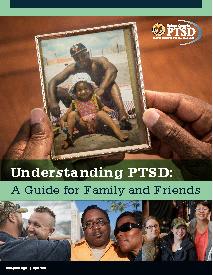Understanding PTSD : A Guide for Family and Friends
Introduction
If someone close to you has been through a life-threatening event, like combat or sexual assault, it can be hard to know how to support them. At the same time, it’s important to remember that this type of event also afects family and friends — and it’s normal for you to struggle, too. After this type of event (sometimes called trauma), it’s common for people to seem diferent than usual, especially at frst. They may be less happy and outgoing, have trouble sleeping, or seem “on edge.” They may have a hard time at work or school. And they may pull away from friends, family, and loved ones — including you.
Most of the time, people start to feel better within a few weeks or months after the trauma. If it’s been longer than that and your loved one is still struggling, they may have PTSD (posttraumatic stress disorder).
Here’s the good news: there’s a lot you can do to help your loved one heal, strengthen your relationship — and take care of yourself too. Things may not go back to exactly the way they were before the trauma, but they can get better — even if your loved one has been struggling for years. This booklet focuses on supporting a loved one who is dealing with PTSD — but the strategies and tips may be helpful for supporting anyone who has experienced trauma.
Geachte bezoeker,
De informatie die u nu opvraagt, kan door psychotraumanet niet aan u worden getoond. Dit kan verschillende redenen hebben,
waarvan (bescherming van het) auteursrecht de meeste voorkomende is. Wanneer het mogelijk is om u door te verwijzen naar de bron
van deze informatie, dan ziet u hier onder een link naar die plek.
Als er geen link staat, kunt u contact opnemen met de bibliotheek,
die u verder op weg kan helpen.
Met vriendelijke groet,
Het psychotraumanet-team.
16 pages | [White River Junction] : National Center for PTSD
https://www.ptsd.va.gov/publications/print/understandingptsd_family_booklet.pdf


